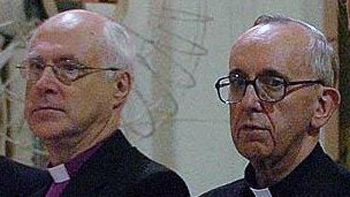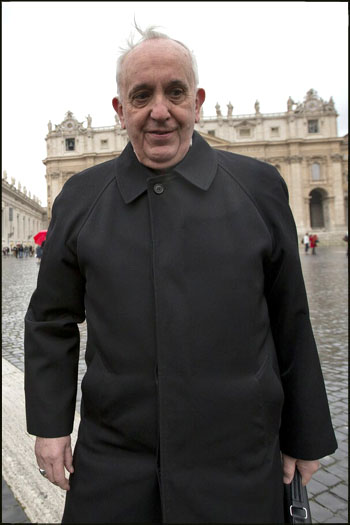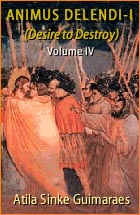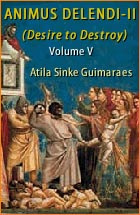Ecumenism
 |
 |
 |
 |
 |
 |
 |
Cardinal Bergoglio:
‘The Church Universal Needs Anglicans’
The Anglican Communion is celebrating the election of Argentine Card. Jorge Bergoglio as Pope. Why? Because he has reportedly said more than once that “the Church universal needs Anglicans” and that “the Ordinariate is quite unnecessary.”
This report comes directly from the Anglican Communion News Service:

Anglican Greg Venables with Card. Bergoglio at an interfaith meeting; Venables praises the papal choice
In a note released after the election of the first ever Pontiff from Latin America, the Anglican bishop of Argentina and former primate of the [so-called] Anglican Church of the Southern Cone, Greg Venables said Card. Bergoglio was “an inspired choice.”
“Many are asking me what he is really like. He is much more of a Christian, Christ centered and Spirit filled, than a mere churchman. He believes the Bible as it is written.
“I have been with him on many occasions and he always makes me sit next to him and invariably makes me take part and often do what he as Cardinal should have done. He is consistently humble and wise, outstandingly gifted yet a common man. He is no fool and speaks out very quietly yet clearly when necessary.”
Venables added that in a conversation with Card. Bergoglio, now Pope Francis, the latter made it clear that he values the place of Anglicans.
“He called me to have breakfast with him one morning and told me very clearly that the Ordinariate was quite unnecessary and that the Church needs us as Anglicans.”
The former primate of the Anglicans of the Southern Cone added, “I consider this to be an inspired appointment not because he is a close and personal friend, but because of who he is in Christ. Pray for him.”
It seems that Pope Francis goes a step further than retired Pope Benedict, who, setting aside doctrinal differences, found common ground with Protestants. In 2009 Benedict established a personal Ordinariate for Anglicans who converted to the Catholic Faith but desired to retain their religious identity, rituals and patrimony.
Would Pope Bergoglio be willing to accept the Anglicans and Lutherans without an Ordinariate and without a conversion? Such a statement implies accepting heretics as such in the Church, under the pretext that the Catholic Church needs them.
Open contradiction with past teaching
After 50 years of conciliar teaching and five progressivist Popes (John XXIII, Paul VI, John Paul I, John Paul II, Benedict XVI), most Catholics – lay and clerical - are oblivious to the fact that this kind of acceptance of false religions conflicts with the past teaching of the Catholic Church.
This new doctrine of tolerance for false religions conflicts with the prior Magisterium, which admitted no tolerance in obedience to the First Commandment of God. The teaching prior to Vatican II was clearly set forth, as seen in Mortalium animos (1928), the encyclical of Pope Pius XI on religious unity.
 There he warned about the growing tendency of “pan-Christians who turn their minds to uniting the churches.” Although, he warned, they may seem to be pursuing “the noblest of ideas in promoting charity among all Christian,” it is not true charity because it injures the Faith. Indeed Pope Pius XI affirms:
There he warned about the growing tendency of “pan-Christians who turn their minds to uniting the churches.” Although, he warned, they may seem to be pursuing “the noblest of ideas in promoting charity among all Christian,” it is not true charity because it injures the Faith. Indeed Pope Pius XI affirms:
“Since charity is based on a complete and sincere faith, the disciples of Christ must be united principally by the bond of one faith.
“Who then can conceive a Christian Federation, in which each member retains his own opinions and private judgment, even in matters that concern the object of faith, even though they be repugnant to the opinions of the rest?”
He concludes it is not possible for men who follow contrary opinions to belong to one and the same religion. It is impossible to receive in the Catholic Church those who do not profess the Catholic Faith.
Now, we have a Pope who has affirmed that the Catholic Church, which he calls the Universal Church, needs to assimilate a heretical sect without asking its members to convert to the true Faith.
As Catholics, we cannot accept such a blatant contradiction with past teaching and denial of the one Faith and must resist any such an imposition on the faithful, even when that teaching comes from the highest authority of the Church.

Posted March 20, 2013
This report comes directly from the Anglican Communion News Service:

Anglican Greg Venables with Card. Bergoglio at an interfaith meeting; Venables praises the papal choice
“Many are asking me what he is really like. He is much more of a Christian, Christ centered and Spirit filled, than a mere churchman. He believes the Bible as it is written.
“I have been with him on many occasions and he always makes me sit next to him and invariably makes me take part and often do what he as Cardinal should have done. He is consistently humble and wise, outstandingly gifted yet a common man. He is no fool and speaks out very quietly yet clearly when necessary.”
Venables added that in a conversation with Card. Bergoglio, now Pope Francis, the latter made it clear that he values the place of Anglicans.
“He called me to have breakfast with him one morning and told me very clearly that the Ordinariate was quite unnecessary and that the Church needs us as Anglicans.”
The former primate of the Anglicans of the Southern Cone added, “I consider this to be an inspired appointment not because he is a close and personal friend, but because of who he is in Christ. Pray for him.”
It seems that Pope Francis goes a step further than retired Pope Benedict, who, setting aside doctrinal differences, found common ground with Protestants. In 2009 Benedict established a personal Ordinariate for Anglicans who converted to the Catholic Faith but desired to retain their religious identity, rituals and patrimony.
Would Pope Bergoglio be willing to accept the Anglicans and Lutherans without an Ordinariate and without a conversion? Such a statement implies accepting heretics as such in the Church, under the pretext that the Catholic Church needs them.
Open contradiction with past teaching
After 50 years of conciliar teaching and five progressivist Popes (John XXIII, Paul VI, John Paul I, John Paul II, Benedict XVI), most Catholics – lay and clerical - are oblivious to the fact that this kind of acceptance of false religions conflicts with the past teaching of the Catholic Church.
This new doctrine of tolerance for false religions conflicts with the prior Magisterium, which admitted no tolerance in obedience to the First Commandment of God. The teaching prior to Vatican II was clearly set forth, as seen in Mortalium animos (1928), the encyclical of Pope Pius XI on religious unity.

Will Pope Bergoglio receive all Anglicans in the Catholic Church without asking for their conversion?
“Since charity is based on a complete and sincere faith, the disciples of Christ must be united principally by the bond of one faith.
“Who then can conceive a Christian Federation, in which each member retains his own opinions and private judgment, even in matters that concern the object of faith, even though they be repugnant to the opinions of the rest?”
He concludes it is not possible for men who follow contrary opinions to belong to one and the same religion. It is impossible to receive in the Catholic Church those who do not profess the Catholic Faith.
Now, we have a Pope who has affirmed that the Catholic Church, which he calls the Universal Church, needs to assimilate a heretical sect without asking its members to convert to the true Faith.
As Catholics, we cannot accept such a blatant contradiction with past teaching and denial of the one Faith and must resist any such an imposition on the faithful, even when that teaching comes from the highest authority of the Church.

Posted March 20, 2013
______________________
______________________
 Volume I |
 Volume II |
 Volume III |
 Volume IV |
 Volume V |
 Volume VI |
 Volume VII |
 Volume VIII |
 Volume IX |
 Volume X |
 Volume XI |
 Special Edition |


